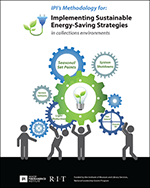IPI’s environmental research activities provide practical solutions for libraries, archives, and museums to achieve sustainable environmental management strategies that achieve the best possible preservation environment while using the least amount of energy necessary. The process of implementing energy-saving strategies, while maintaining or improving preservation quality, requires a series of carefully defined, risk-managed steps that test individual energy-saving strategies to identify the appropriate final approach for a unique collection, space, and mechanical system. While no single solution will work for every institution, there are a series of practical energy-saving strategies that will work in some combination for nearly any collecting institution.
In collecting institutions an environmental management team that includes both collections and facilities staff creates a structure in which the insights gained from environmental monitoring are actively used to inform environmental management. Institutions that have been most successful at the team approach to environmental management are able to implement regular meetings of collections and facilities staff to review data, discuss strategy, plan for changes, and generally inform each other about what is going on in their respective worlds. Environmental data drives these discussions, and therefore starting with a well-established monitoring program is essential.
States Consulted In
IPI advises collecting institutions nationally and internationally.
Awarded in Research
Multiple research grants have informed IPI’s resources and consulting services in sustainable preservation practice.
Years of Research
IPI has conducted research for over 20 years in environmental management.

IPI’s preservation environment studies have explored the feasibility and effectiveness of intentional HVAC shutdowns, temperature and RH setbacks, the implementation of HVAC-controlled RH profiles, and the impact of temperature transitions on moisture content in hygroscopic collections materials. In 2017, IPI completed an online guidebook, IPI’s Methodology for Implementing Sustainable Energy-Saving Strategies for Collections Environments, that outlines the IPI methodology for establishing sustainable environmental management programs in cultural institutions. The goal for the guidebook, a project funded by the Institute of Museum and Library Services, was to produce a resource specific to cultural institutions that professionals can use to identify, test, and assess implementing energy-saving strategies in collections spaces without the assistance of external consultants.
In the summer of 2021, IPI distributed an online questionnaire about crate, crate preparation, and packing materials used by collecting institutions to transport paper-based objects. The questionnaire was posted to the American Institute for Conservation’s Global Conservation Forum and Member Community distribution lists in June and via this quarterly newsletter in July. Seventy-six professionals from Asia, Europe, North America, Oceania, and South America completed the questionnaire, and the results are summarized in this report. This initiative is part of a three-year research project, Cost-Efficient and Environmentally Responsible Preservation Methods for Preparing Paper-based Objects for Transit and Display, where IPI’s team is collating data to inform material selection and to support the preparation of laboratory experiments that will compare crate and packing materials performance under changing environmental conditions.
IPI distributed an online questionnaire in November 2020 to inform a current inventory of commonly used materials and designs for sealed frame packages. We are grateful to the more than 100 colleagues, working in a variety of collecting institution types around the world, who responded to our sealed frame package questionnaire. In September 2020, IPI began a three-year research project funded by the Institute of Museum and Library Services designed to identify the most cost-efficient and environmentally responsible preservation methods of preparing paper-based collection objects for transit and display. During the first phase of this project, IPI distributed an online questionnaire in November 2020 to inform a current inventory of commonly used materials and designs for sealed frame packages. We are grateful to the more than 100 colleagues, working in a variety of collecting institution types around the world, who responded to our sealed frame package questionnaire. Twenty-five respondents also generously contributed annotated schematics of the sealed frame package designs used at their institutions. The information collected will inform additional phases of the project, including testing a variety of sealed frame package designs under several different temperature and relative humidity profiles to compare how they perform. Each design will also be evaluated for cost and environmental waste comparisons. The ultimate goal is to provide guidelines for creating the most cost-efficient and environmentally responsible sealed frame packages that provide the desired preservation goals.